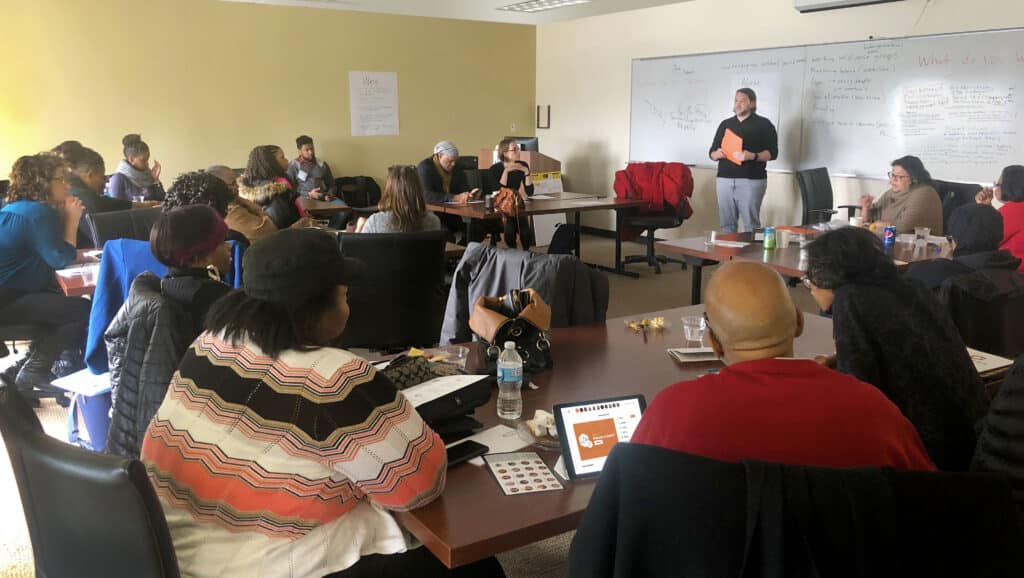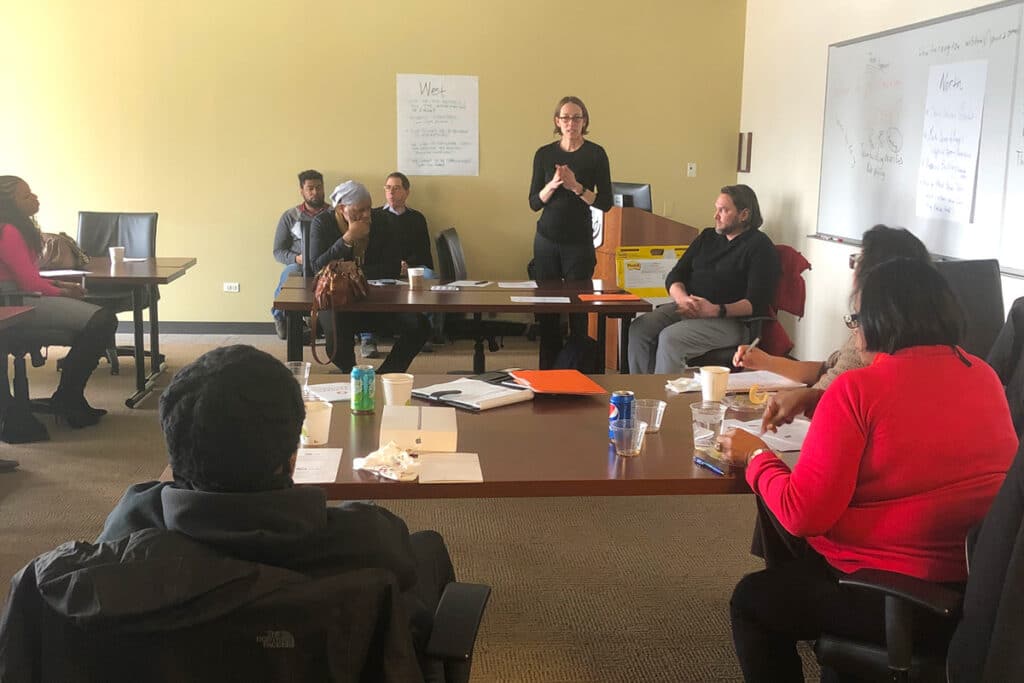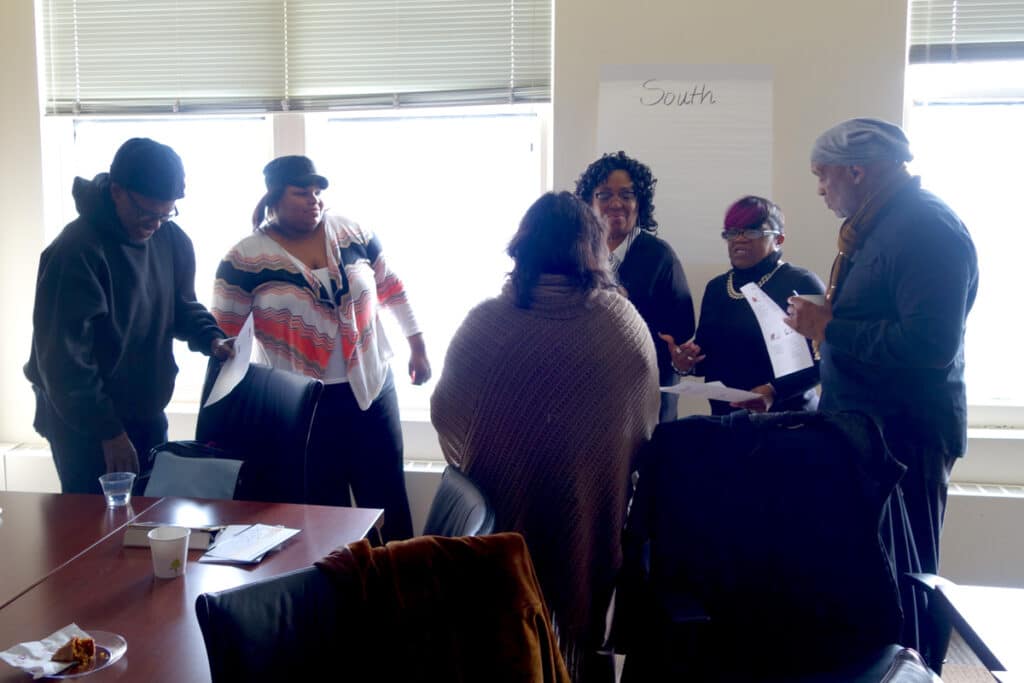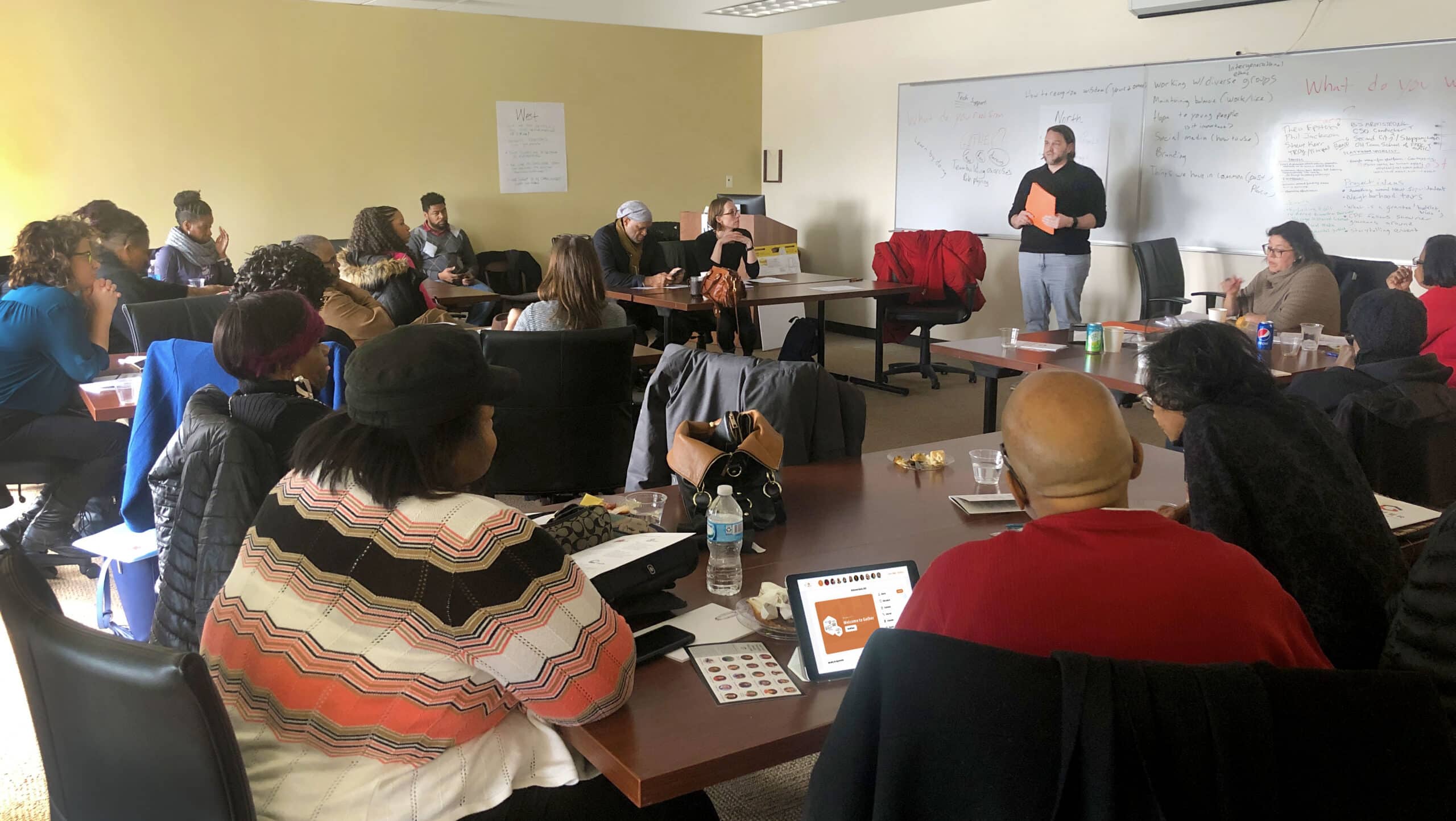Learning Together with the Chicago Peace Fellows
After her son Darren was shot to death in 2012, Lisa Daniels was frustrated that media coverage focused exclusively on his criminal record. Her son made bad decisions with consequences he didn’t anticipate, but he was a loving child, father and loyal friend, and Lisa felt strongly that he should be remembered for more than just his worst mistake. She founded the Darren B. Easterling Center for Restorative Justice to help other young men and their mothers in similar situations, beginning her work by showing compassion for the young man who killed him, asking the court for leniency.
“Like each and every one of us, Darren was a flawed human being, created in God's perfect image. Without the Center, his life would have ended in a blaze of gunfire. Now it carries on in an illumination of promise, of hope, of love.” -- Lisa Daniels

The Goldin Institute recently selected Lisa and 18 other compassionate, resourceful individuals for the first cohort of Peace Fellows in partnership with the Chicago Fund for Safe and Peaceful Communities. In the months ahead this groundbreaking collaboration between the Conant Family Foundation and the Goldin Institute will support neighborhood-level initiatives to build safer and more peaceful communities across the city.
On March 8, Lisa attended the launch event for the Peace Fellows at DePaul University’s downtown campus along with other grassroots leaders. Expressing her hopes and expectations for the Peace Fellows, Lisa said, “Give me all the information I need to do what I need to do.”
Another Peace Fellow, Ken Butler, executive director of the Major Adams Community Committee in the North Lawndale neighborhood, was thrilled to be sharing experiences and best practices as well as pitfalls with other practitioners.
“A lot of the time, when you’re the head of an organization, they won’t tell you it’s bunk. But I really need honest feedback to know I’m on the right track.” -- Ken Butler
Commenting on her first day meeting with the Fellows, Maria Velasquez, executive director of the Telpochcalli Community Education Project in the Little Village neighborhood, worked with other groups. “I’m very structured, but it’s important to be flexible too,” Maria said.

“It’s not enough to train servant leaders unless you train servant structures.” -- John Zeigler
Expressing her enthusiasm for the Peace Fellows’ debut, Leslie Ramyk, executive director of the Conant Family Foundation, added that philanthropies supported grassroots leaders to identify and develop solutions to problems at the neighborhood level.
“When it comes to issues you’re facing in your communities, I’m not the expert,” Leslie said.
“This is about you telling us what’s needed. This is your time, your space. You don’t need to impress anyone, except maybe each other.” -- Leslie Ramyk
In his remarks, Goldin Institute Executive Director Travis Rejman said the Chicago Peace Fellows culminated 17 years of work around the world. In 2002, the Goldin Institute convened dozens of international grassroots leaders and chartered the organization’s mission based on their ideas, challenges and aspirations.
“You are joining a group of people who want to learn together, who are not just in Chicago but around the world. The Peace Fellows initiative is the latest expression of the mission of the Goldin Institute.” -- Travis Rejman
Each Peace Fellow received a stipend and a specially configured iPad loaded with the GATHER curriculum and integrated software. Goldin Institute senior staff created the Peace Fellows curriculum based on our 17 years of experience building the capacity of grassroots organizations around the world, and after extensive discussions with community leaders, scholars, government officials and key figures at area institutions.

The Fellows are learning cutting-edge concepts such as asset mapping and conflict resolution, conducting site visits to organizations and foundations here in Chicago, and meeting virtually with experts and other community leaders around the world. Most importantly, they are sharing their own hard-earned wisdom based on practical experience as they prepare for the summer, when they will have an opportunity to use the new techniques and concepts they’ve learned in collaborative projects that will be funded by the Chicago Fund for Safe and Peaceful Communities to obviate violence and remediate its consequences.
The Peace Fellows were chosen through an intensive application and interview process drawing from the ranks of previous grantees of the Chicago Fund for Safe and Peaceful Communities, a coalition of 40 foundations that are aligning their investments to support proven and promising approaches to reducing gun violence.
Special thanks to DePaul University for hosting our first in-person meeting and to the generous support from the Conant Family Foundation, Polk Bros. Foundation, Chase Bank and the Chicago Fund for Safe and Peaceful Communities that makes this work possible.
Chicago Peace Fellows Take Shape

The Goldin Institute recently brought together community leaders with key figures at a range of Chicago area civic institutions to gear up for the Chicago Peace Fellows, a joint initiative with the Conant Family Foundation and other philanthropies that will be the first domestic application of the GATHER curriculum and software, our tablet-based, capacity-building program for grassroots community leaders.
After yet another year where violence shattered too many of Chicago’s families, some of the city’s best minds talked over two dinners in December and January how technology, policy and communication can all be tools to empower those who are on the front lines of trying to mitigate, obviate and devise alternatives to terminate the violence. These civic leaders are helping to inform the curriculum that is based on the insights and aspirations of community leaders at the forefront of violence prevention in the city.

In coming weeks, the Goldin Institute will begin an intensive recruitment and application process to select the first class of Peace Fellows who will all be drawn from the grantees of the Chicago Fund for Safe & Peaceful Communities, a special grant opportunity which has drawn together the largest and most prestigious philanthropies in the city.
At the first dinner, Justice Stamps, who runs the Marion Nzinga Stamps Youth Center mentoring program on the Near North Side, expressed concerns about the general relationship in Chicago between community organizations and philanthropies, warning that current strategies were often “a band aid to a much greater problem.”
The voices of youths and young adults who are both the victims and perpetrators of violence are not included sufficiently in conversations about how grants are allocated, she elaborated. While many grants are won by small, grassroots operations, the dollar amounts are modest and these groups remain desperate for financial support. On the other hand, large, well-established non-profit organizations have a significant competitive advantage.
[quote]"We need the funders to get away from cookie cutter funding. We're going to do a block party in August and they are going to get killed in January." - Justice Stamps [/quote]
To remedy these issues, Justice suggested that an umbrella organization provide infrastructure and support to the “people doing the trench work.”

Dan Lurie, senior fellow and director of the Chicago office of the New America Foundation, agreed with Justice about the need to support grassroots operations, adding that while the dollar amounts of grants awarded under the Safe & Peaceful Communities Fund were too small to dramatically reduce the level of violence in the city, a strategic approach could leverage government agencies, in particular, to play a larger role.
[quote]"There needs to be new money, but is there a way to disrupt philanthropy with this kind of fund? A lot of funders would welcome being disrupted.” - Dan Lurie[/quote]
Jose Rico, a political activist and aldermanic candidate, pointed out that the enormous sums spent on criminal justice and incarceration dwarf the amounts spent on education, prevention and alternative activities.
[quote]“We know we are not getting the outcomes we are hoping for.” - Jose Rico[/quote]
Robin Robinson, a longtime Chicago television news anchor who is currently a special adviser to Chicago Police Superintendent Eddie Johnson, added that race and racism must be included in discussions of how to stop the violence in the city.
[quote]“There is a way to talk about race that doesn’t make everyone cringe back." - Robin Robinson[/quote]
At the second dinner in January, participants discussed the role hospitals and research institutions could play as well as how the collateral effects of violence radiate throughout the community.
Daniel Cooper, author of The War on Neighborhoods: Policing, Prison, and Punishment in a Divided City and Director of Research at the Metropolitan Planning Council said that while good research was essential, it had to be shared with the communities who were being researched: “With that data, there is a great deal of responsibility to use it to be uplifting to community members and to be as transparent as possible.
[quote]“We have to make sure we are turning back the power of data to the community organizations that worked with us." - Daniel Cooper [/quote]
Leif Elsmo, executive director of Community and External Affairs at the University of Chicago Hospitals, discussed his institution’s recent experience with opening a trauma center, noting that they had discovered that the emergency room was an opportune location for intervention.
[quote]“People who come into the hospital with gunshot wounds are more likely to be hurt again or to hurt someone themselves." - Leif Elsmo
Ghian Foreman of the Washington Park LLC described the effects of a six-week basketball tournament he organized in the Harold Ickes Homes public housing development more than a decade ago, citing it as an example of the types of programs that can be effective: “It was only 6 weeks, but those 6 weeks were six weeks of peace.”
Nedra Sims Fears, executive director of the Greater Chatham Initiative, noted that the financial burdens of the criminal justice system fall disproportionately on the women who live in the same communities where incidents of crime and violence are highest. She described a neighbor who mortgaged her home to pay for a lawyer representing her son in a criminal case and then explained how her own family spent thousands of dollars to house a nephew who had been released from prison.
[quote]“Black women are the ones paying for this missing generation of Black men. We pay for their absence, for their lost wages, for their criminal defense, and for the revolving door of the justice system. These are not statistics. These are people we know, in our families. This is real. - Nedra Sims Fears [/quote]
Eddie Bocanegra, a senior director at the Heartland Alliance who was both the perpetrator and victim of violence and was incarcerated, said that he grew up in the Little Village neighborhood during the years Chicago suffered more than 1,000 homicides each year, but had a close, loving family who welcomed him back into the fold when he completed his term in the penitentiary.
[quote]“My family was my infrastructure that I could tap into when I got back. Today, what’s it going to take for young people for young people to stop for the amount to think about the direction they are going? Part of it is therapy but mostly it is just relationships.- Eddie Bocanegra [/quote]
